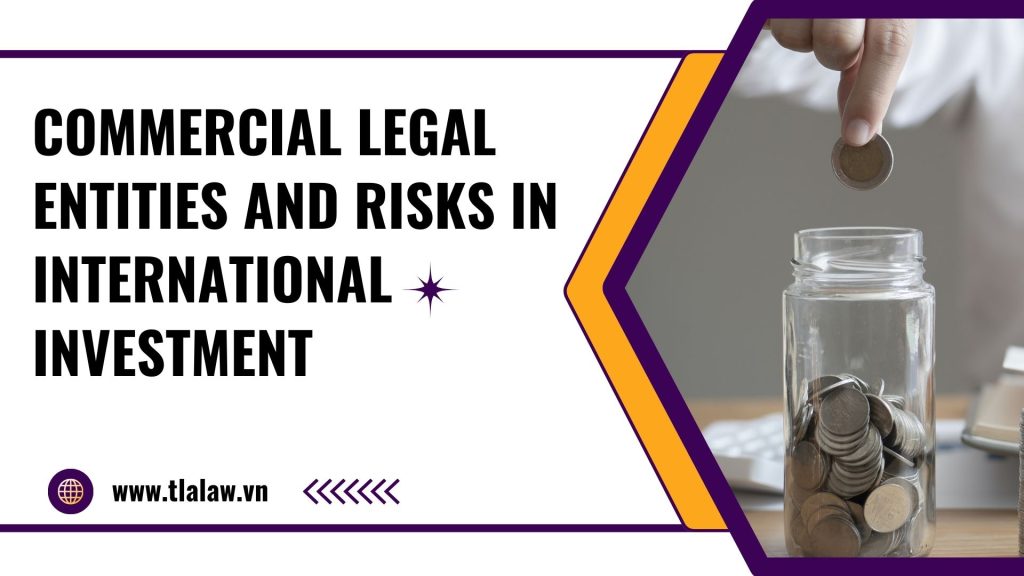
In the context of global integration, Vietnam is increasingly expanding international trade, not only attracting foreign investment but also promoting outbound investment activities. Commercial legal entities play a crucial role in this process, fostering economic development and driving growth. However, rapid expansion also entails numerous potential risks. Let’s explore this topic further in the article below.
1. Overview of commercial legal entities and international investment
a. Commercial legal entities
According to Article 75 of the 2015 Civil Code, a commercial legal entity is defined as an entity whose primary objective is to seek profit, with such profits distributed among its members. Commercial legal entities include enterprises and other economic organizations.
To qualify as a commercial legal entity, an organization must meet the basic conditions for legal entities stipulated in the 2015 Civil Code. First, the organization must be legally established according to the Civil Code or other relevant laws, ensuring a firm legal foundation for its operations. Second, it must have a clear and appropriate organizational structure, as defined in Article 83 of the Civil Code. Third, the organization must own independent assets separate from personal or other legal entities’ assets and bear responsibility for its obligations with its own assets. This ensures the organization’s independence and self-accountability in all legal relationships. In addition, the primary objective of commercial legal entities is profit generation.
It is essential to distinguish between commercial and non-commercial legal entities. As per Article 76 of the 2015 Civil Code, non-commercial legal entities do not have profit-seeking as their main goal, nor do they distribute profits to members. In contrast, commercial legal entities aim to generate profits, and all their activities are directed towards this goal.
b. International investment
International investment refers to the act of investors transferring capital or other assets to another country to seek profits or achieve social benefits. This activity includes foreign direct investment (FDI) and indirect investment through international financial markets.
Characteristics of international investment:
- Investment capital: It takes various forms, such as money, tangible and intangible assets, convertible into monetary value for easy comparison. Investment assets must have clear value to ensure transparency and manageability.
- Participants: These include governments, international organizations, private companies, and economic corporations. These entities play key roles in investment strategy formulation and the implementation of large projects.
- Economic and social benefits: International investment not only generates profits but also promotes economic and social development in the host country, creating jobs and facilitating technology transfer.
- Risks and uncertainties: International investment faces unpredictable factors such as market volatility and cultural, political, and legal differences.
- Cross-border capital movement: While capital is transferred to the host country, ownership rights remain with the investor, reflecting the global financial resource movement aimed at optimizing profits.
2. Legal risks faced by commercial legal entities in international investment
Currently, Vietnamese law does not provide a specific definition of legal risks in international investment. However, Clause 6, Article 2 of Decision No. 105/QĐ-UBCK defines legal risks as those arising from non-compliance with legal regulations related to business activities or from contract termination due to illegality, exceeding authority, missing terms, or other incomplete standards.
a. Risks arising from subjective causes
- Legal personality risks: Members of a legal entity may misuse their legal status to commit fraud or provide false information, causing harm to partners.
- Financial and asset risks: Enterprises may misreport financial information to attract capital or lack capacity for international market research, leading to significant losses. Additionally, internal financial mismanagement could weaken the enterprise’s global competitiveness.
b. Risks arising from objective causes
- Legal changes: Sudden legal changes in the host country may disrupt business activities, especially when enterprises lack access to official information or professional legal support.
- Law enforcement risks: Inconsistencies or unfairness in law enforcement may reduce the protection of investors’ rights. For example, the dispute between Copper Mesa Corporation and the Ecuadorian Government, where Ecuador revoked mining projects without compensation.
Commercial legal entities must thoroughly understand and prepare for legal aspects to protect their rights and optimize efficiency in international investment projects. Developing a solid legal strategy and implementing appropriate risk management measures can help enterprises mitigate the adverse impacts of legal factors during their investment journey.
Contact Our Legal Experts
At TLA, our experienced lawyers specialize in diverse legal fields, including criminal, civil, corporate, and family law. We provide comprehensive legal support and personalized advice.
For Expert Legal Consultation, Contact Us:
1. Lawyer Vu Thi Phuong Thanh – Director of TLA Law Firm, Hanoi Bar Association.
Email: vtpthanh@tlalaw.vn
2. Lawyer Tran My Le – Chairwoman of TLA Law Firm’s Members’ Council, Hanoi Bar Association.
Email: tmle@tlalaw.vn
Address: Floor 7, No. 6 Duong Dinh Nghe Street, Yen Hoa, Cau Giay, Hanoi
Website: https://tlalaw.vn/
Hotline: 0906246464
_LTTTra_

